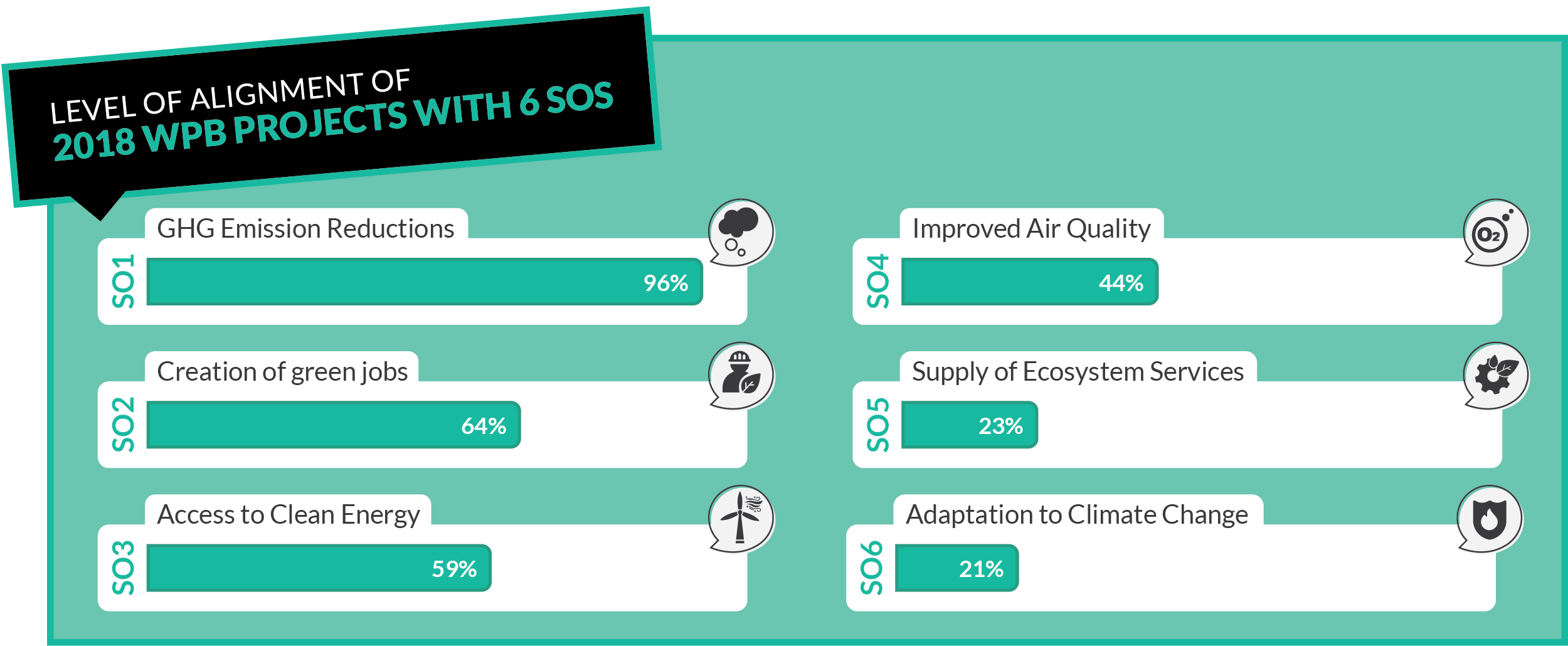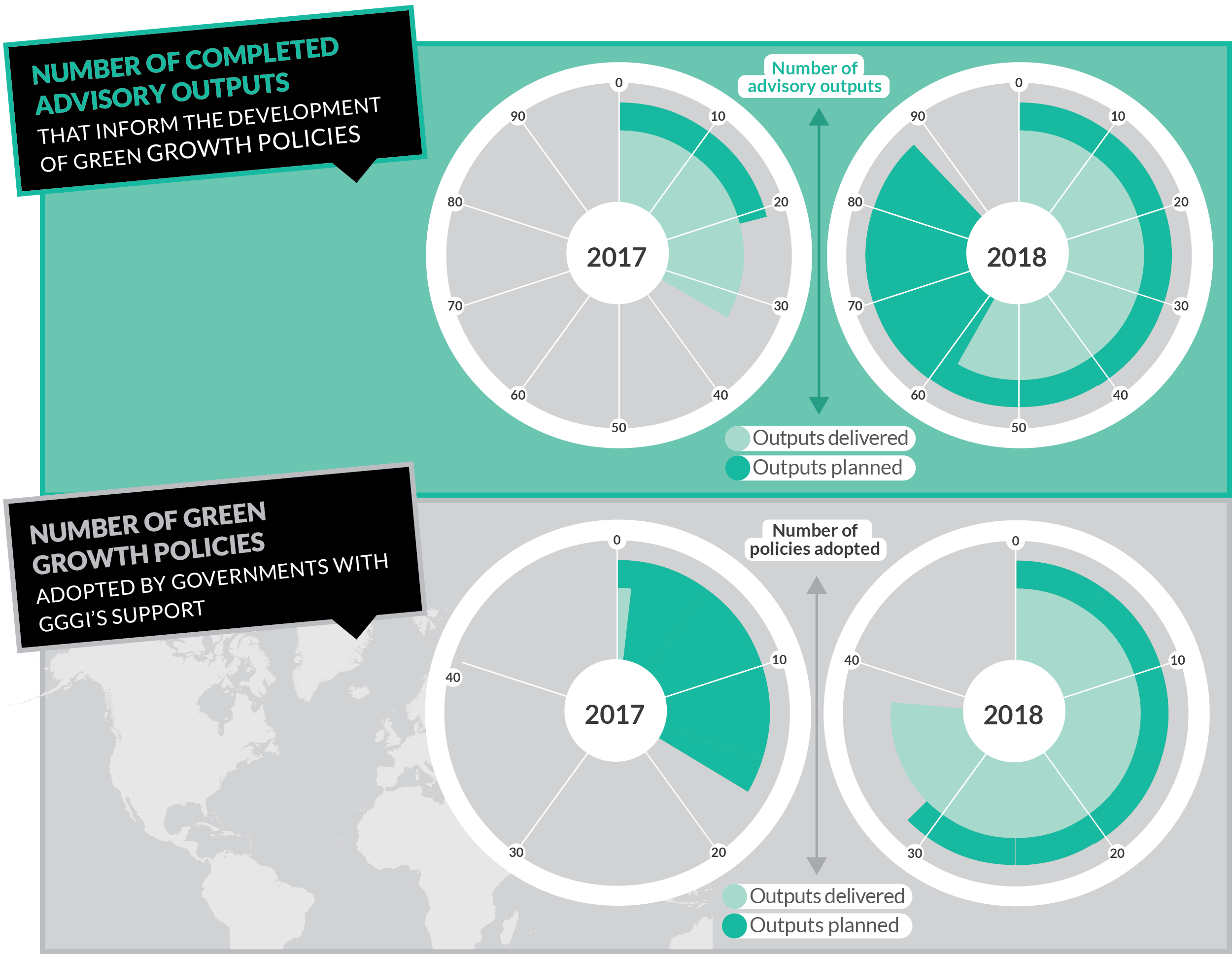KEY MESSAGES
Halting the rise in global temperatures, addressing the impacts of climate change, and delivering the national development goals of countries around the world cannot be achieved by any one government, organization, or stakeholder. Multi-stakeholder partnerships are critical to driving the 2030 Agenda for Sustainable Development and meeting NDCs commitments. The transition to a model of economic growth that is green - that is climate-resilient, environmentally sustainable, and socially inclusive - can only be accomplished through strong, innovative, and catalytic partnerships.
Recognizing the importance of partnerships to deliver at greater scale and impact, GGGI has committed to identifying and engaging with partners that share its mission. In 2018, GGGI developed over 70 partnerships in the delivery of 30 projects. GGGI’s diverse partnerships count
governments, financial institutions, the private sector, academics institutions in developing and developed countries, intergovernmental organizations, and global initiatives and platforms that bring together stakeholders and scale-up green growth impact.
GGGI’s development of longer-term partnerships with stakeholders benefit its Member and partner countries and the organization itself. Prioritizing delivery of work with strategic partners rather than outsourced consultancies allows GGGI to build its in-house capacity and better maintain and share knowledge gained though project implementation. GGGI growing network of partners provide Member and partner countries with increasing opportunities to leverage knowledge and capacity and mobilize climate finance to realize green investments.
GGGI's Results at a Glance

In 2018, GGGI’s Member and partner countries achieved impactful green growth results. Results that can be replicated in other countries, brought to scale to increase impact, and catalyze knowledge sharing and partnership with other countries. The reporting of GGGI’s 2018 results covers programmatic, business management and financial outcomes and outputs. A total of 70 projects were
delivered in year two of the Work Program and Budget 2017‐2018. With a total budget of USD 49.9 million in 2018, GGGI spent USD 30.7 million or 61% on country programs. The balance of 39% of the budget was spent on global programs and HQ‐based divisions and staff which support and enable the country and global programs and projects.

The 70 projects that GGGI implemented in 2018 were based on the demands and priorities of Member and partner countries and are all aligned with one or more of GGGI’s six Strategic Outcomes (SOs) and the Sustainable Development Goals (SDGs). They indicate the strategic relevance of these project interventions in closely supporting the delivery of Member and partner countries Nationally Determined Contributions (NDCs) commitments and SDGs. GGGI projects are most closely aligned with SO1 on GHG emission reductions with 96% alignment. Projects are least aligned with SO6 on climate adaptation at 14%. GGGI’s 70 projects were most aligned with SDG 13 on climate action (74%) followed by SDG 7 on affordable and clean energy (66%).
Developing green growth national policy and institutional frameworks
Sound enabling green growth policies and plans are a precursor to mobilizing green investment projects.
Based on a strong platform of growing global network of partnerships, a total of 88 policy advisory assignments were completed in 2018 with GGGI’s support covering 24 countries, and governments adopted 32 of these policies covering 17 countries.
From the adoption of the Green Cities Development Strategy in Senegal, launch of a national e-mobility action plan by the Nepalese government, the launch of the Fiji Low Emission Development Strategy and, to the mobilization of Green Climate Fund finance to develop green cities in Rwanda and the establishment of a national financing vehicle to increase renewables and energy access in Vanuatu, GGGI’s Member and partners countries demonstrated that growth can be green.

Catalyzing green growth investments
GGGI works closely with Member and partner countries and stakeholders’ partners to help design and implement targeted investment projects that support their green growth transformation.
GGGI helped successfully mobilize in 2018 nearly half a billion dollars - USD 482 million - in green investments in 2018. This large-scale investment which represents 90% public sector and 10% private sector contribution will benefit a total of 21 projects in 17 countries.
Examples of such investments include the USD 250 million Colombia “Joint Declaration of Intent on Deforestation” that aims to rehabilitate deforested areas in Colombia, the USD 33 million project on strengthening of climate resilience of rural communities in Northern Rwanda, the USD 25 million Sonora State Green Bond for Bus Rapid Transport (BRT) development and the USD 18 million Guyana Solar PV Program.
Furthermore, GGGI also developed a very healthy and growing new green investment project pipeline worth over USD 650 million. GGGI was successful in delivering 48 completed advisory outputs that inform decisions on green growth policies. Examples of such policy outputs include the policy proposal for a national financing vehicle proposal for electric mobility in Nepal, development of two bankable projects for BRT system in Jordan and a USD 7 million forestry management proposal in Ethiopia.

Multi country knowledge sharing and capacity building
GGGI plays a strategic role as a broker of green growth knowledge and learning between countries and other non-state actors. In 2018, GGGI delivered a total of 319 capacity building activities benefitting a total of 10,466 participants, 53% of whom were men and 47%, women.
The participants benefitted from knowledge and skills development and transfer which enhanced member and partner countries’ capacity to develop and implement green growth policies and plans, investments and project implementation. Other key achievements in 2018 include:
- 46% of capacity development activities drew on lessons from other GGGI countries compared to 37% in 2017.
- Out of the 32 policies adopted by governments, 14 policies had incorporated lessons and experiences from other GGGI countries.

Maximizing organizational effectiveness and efficiency
In 2018, GGGI took significant steps to reorganize its business to become a nimble, dynamic, efficient, effective and accountable organization that is responsive to the broad and changing development needs of its Member and partner countries. Some of the key initiatives taken include:
- Implementation of GGGI Online - the organization's new project management information system aiming to strengthen GGGI's project cycle management process.
- Active implementation of GGGI's Risk Management Framework, approval of a new Disclosure Policy, commencement of IATI reporting.
- Enhancing GGGI's positive work environment by updating and broadening staff rules and regulations, introduction of flexi-work and the appointment of a part time Ombudsperson.
- Adoption of a decentralized business model, envelope work program budgeting, adoption of country business plans, mobilization of earmarked donor funding and a continuous project cycle to empower country offices.
